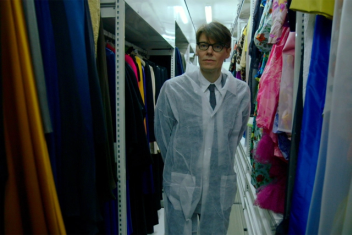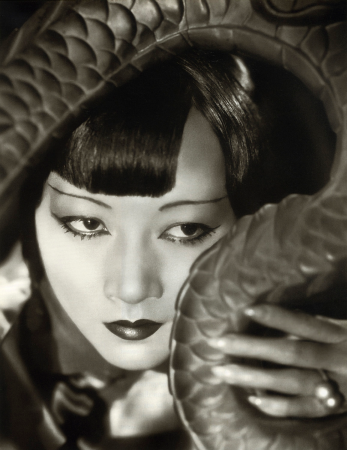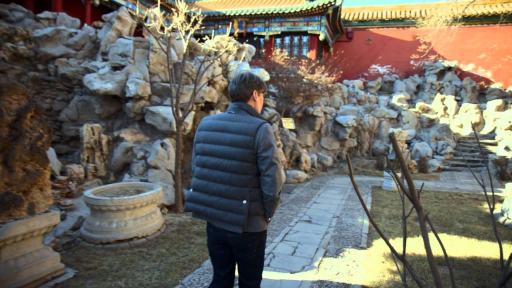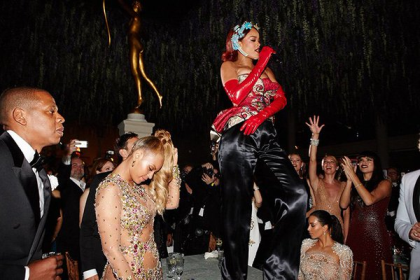We were headed out to see South32, of all things, but realized we couldn’t make it to the theater on time. So we went to the closer theater to see Remember (or The Last Nazi Picture Show as I call it) and it was sold out! In the middle of the day! After having been out for over a month! So, we both had to see Remember at the next opportunity and figure out what to see that day, standing out there in front of the box office.
In other words, I had no intention of seeing The First Monday In May, a documentary about the travails of putting on a Big Fashion Exhibit at the Metropolitan—said preparations culminating in the famous Met Gala, which is sort of the ultimate cool-kids-lunch-table-in-the-cafeteria event, despite the glowing reviews. Because, honestly, it’s practically the epitome of things about-which-I-do-not-care. Even the potential for the draw of feminine pulchritude is greatly diminished because fashion models tend toward the repellant (and I’m not the target audience anyway).

Unlikely to grace the centerfold of a men’s magazine like that.
But the first thing the movie cleared up for me was the whole concept of fashion shows. If, like me, your exposure to fashion shows is periodically seeing “news” stories trumpeting the most bizarre fashions exhibited on the catwalk, you just sort of shrug and think, “Well, that’s stupid. Nobody’s going to wear that.”

Well, maybe to the Safeway. On Easter.
Which is obvious, if you think about it for even a second. So it makes sense that these shows aren’t about “clothes you wear” but a person who makes clothes attempting to make an artistic statement. Which, by the way, turns the prime joke in Zoolander—a line of clothing designed after homeless people, “Derelicte”—in on itself. That’s exactly the sort of thing a designer might do, but it would be to draw attention to the plight of the homeless, or somesuch. But I’d never thought about it because, again: Don’t care.
However, I do like stories of artistic struggle, and that’s ultimately what this is about. Our protagonist in this journey is Andrew Bolton, whom I swear turned up in the the last fashion movie we saw (which was Dior and I, and it’s not linked because apparently I forgot to review it) along with a lot of the other luminaries here (and why wouldn’t they?). Bolton’s issue is this: His first show was a huge smash with edgy fashion by a recently deceased (suicide) designer. All of his subsequent shows have been greeted with “Well, it’s good, but it’s no…”

Our hero!
A common artistic problem, all the more aggravated by the fact that Bolton isn’t some guy working out of his garage. He works at the Met. He’s got bosses. He’s got money men. He’s got people with opinions. Like, everyone has a damned opinion!
And the number one opinion, boiled down, seems to be something like: “Hey, don’t overdo it.”
Heh. It’s impossible for me not to empathize with the guy. My favorite variant of this comes from Chinese film director Wong Kar-Wai (who directed the confusing 2046, as well as Grandmaster, but who is here because of his early work on Days of Being Wild) who counsels (paraphrased) “Don’t show too much. Because seeing too much is like seeing nothing.”
How very true and very Chinese. And how very squashing to the guy who wants to GO BIG.
Anyway, the theme of the exhibit is China, and how The West has interpreted China over the past 100 years or so. And there’s a certain amusement for this viewer in watching the wheels of political correctness spin so hard as to potentially come off and decapitate the audience (which probably wasn’t using that body part much anyway). Anna May Wong, inevitably, emerges as a central character in the exhibit, epitomizing as she did the American notion of the exotic Orient.

The great thing about Wong is that you can pretend you’re enjoying her ironically.
And while much clucking of tongue is done at her presumed horrid treatment by Hollywood (unlike the many caucasian actors starring in Chinese cinema 100 years ago, or today, even) one fashion designer confesses up front that he has no desire to see the authentic Chinese garb. He wants the stereotype and the dream and the glamor, and that’s what he’s going to run with.
And why not? Real Chinese clothes are going to be pretty awful, as most people’s clothes have been over the eons. Why wouldn’t you take an impression, an idea, a dream, and run with that? It’s culturally insensitive or something? It’s “appropriation”? Of course, that’s all nonsense, but it’s a nonsense generally subscribed to and promoted by the sorts of people who are in and around this industry. (What is PC, after all, but the ultimate fashion statement?)
Then there’s the whole Mao thing. There’s little uglier than Communist clothes, but they get a little pocket, just outside the room with all the Buddhas. Bolton wanted to put them in the room with the Buddha, bot Wong suggests that doing so would offend both the Buddhists and the Communists. It was one point where I felt Bolton was gratuitously trying for controversy, and I really thought he should’ve had the Mao pocket filled with skulls instead. That’d be sufficiently provocative and both literally and metaphorically true in terms of fashion and actual corpses generated.
But—and this to me was the oddest thing—he actually flew to Peking (I’m not calling it “Beijing”, not ever) to get the seal of approval from whatever functionaries the totalitarian government has there to approve, I guess, foreign representations of Chinese culture. And her (the bureaucrat’s) feedback was just as banal as you’d expect: You’re looking to the past, what about China’s wonderful present and future.
Ugh.

Meditating on how not to offend the mass murderers.
The other fascinating thing was the actual gala itself, which Anna Wintour (She Who Wears Prada) puts on. There’s a little bit of time spent on her, which is probably off point, but I didn’t mind. She’s an interesting character. And, much like when I hear Paul Anka ranting, it makes me think “Well, I was never interested in her before…” I mean, seriously: You don’t throw a party for the most in-demand people in the world and raise tens of millions of dollars by being “nice”.
And she is good at it. She cuts down the size, lamenting the 600 or more at the previous gala. The people seem only to be useful for their status. Justin Bieber wanders around in his clueless way, for example. There’s probably too much of him. I mean, in the movie. (And life imitates art.)
Rihanna performs and, as The Boy commented, “the aristocracy is weird”. They are. They’re dressed in finery and surrounded by opulence, and the music they “dance” to is gutter stuff. It’s weirdly discordant. This isn’t meant as a comment on Rihanna’s music per se because, honestly, I don’t remember it much at all, except that it didn’t strike me as, you know, music. And it was followed on the soundtrack with Nat King Cole’s rendition of “Stardust”, which is so much more fitting of the tone of the exhibit and the whole movie that the “aristocracy” not only looks weird, they look degenerate.

Singin’ ’bout oppresion. And boo-tay.
A fascinating film on a lot of levels. And the final product, by Bolton, is truly a work of art.
Summing up on the three-point scale:
1. Subject matter. Superficially, rich people doing rich things, which isn’t super interesting. More centrally, though, about an artist’s struggle to create something big.
2. Treatment. Very professional. A few digressions (as with the Wintour stuff) don’t really detract from the proceedings, which is a neat trick. It’s only about 90 minutes, and only the very end seems a little dragged out.
3. Bias. Who knows? Did Wintour look more sympathetic than she should have? Is Bolton just self-indulgent? I don’t think so. And since both are pretty damn successful at what they do—and what they do brings dollars in to the museum—I’m going to say not.
Worth checking out.

One thought on “The First Monday In May”